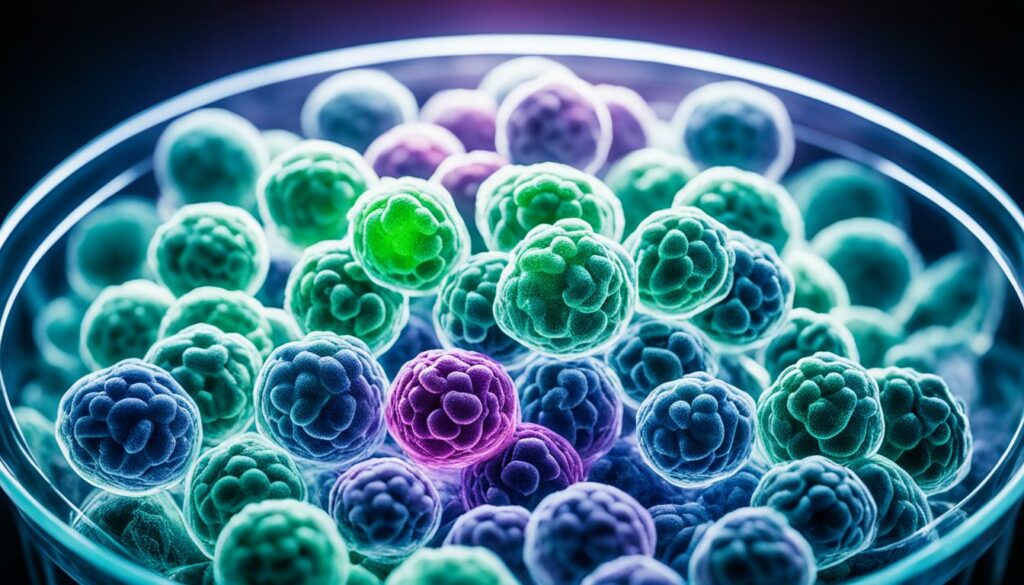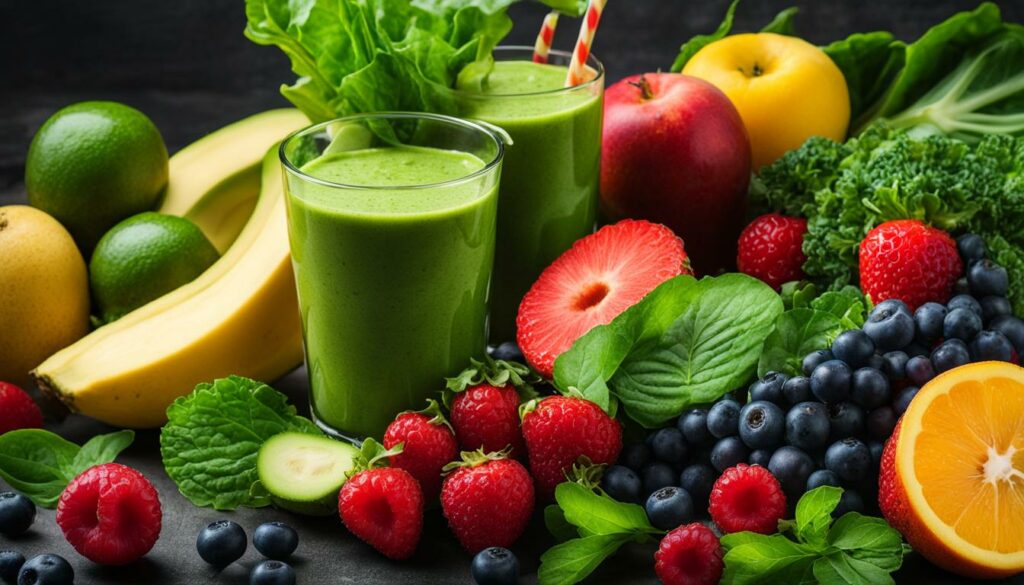Did you know that a 24-hour fast can reverse the age-related decline in intestinal stem cell function?
According to a study from MIT biologists, fasting has a significant impact on the regenerative abilities of stem cells, offering exciting possibilities for improving overall health and treating certain conditions.
In this article, we will explore the connection between fasting and stem cell regeneration and discover how proper nutrition and supplements can further enhance the regenerative potential of stem cells.
Key Takeaways:
- Fasting stimulates stem cells to become more regenerative, reversing age-related decline in their functions.
- Prolonged fasting activates pathways that enhance stem cell regeneration and increase cellular resistance to toxins and stress.
- Nutrition plays a crucial role in the effectiveness of stem cell treatment, with certain compounds found in foods promoting stem cell activation.
- A lower caloric diet and fasting can increase natural stem cell production by switching the body’s metabolism to use fatty acids as fuel.
- While there is limited scientific evidence, some supplements like resveratrol and curcumin have shown potential in supporting stem cell function and proliferation.
The Connection Between Fasting and Stem Cell Regeneration
Fasting has been shown to have a remarkable impact on the regenerative abilities of stem cells. Prolonged fasting, ranging from 24 to 120 hours, activates pathways that increase cellular resistance to toxins and stress, potentially enhancing stem cell regeneration in both mice and humans.
This connection between fasting and stem cell activity suggests a promising avenue for enhancing immune system regulation and cellular rejuvenation.
Increased Stem Cell Regeneration After a 24-Hour Fast
A study conducted by researchers at MIT revealed that stem cells significantly increased their rate of regeneration after a 24-hour fast.
This increase in regenerative capacity was observed in both aged and young subjects, underscoring the potential benefits of fasting for stem cell health. By stimulating stem cell activity through fasting, individuals may be able to unlock the regenerative powers of these cells for improved overall health.
“Fasting can make stem cells more regenerative.”
To further understand the impact of fasting on stem cell regeneration, let’s explore a comprehensive table comparing the effects of intermittent fasting on stem cell activity:
| Duration of Fasting | Stem Cell Regeneration |
|---|---|
| 24 hours | Significantly increased regeneration rate |
| 48-120 hours | Activation of pathways increasing cellular resistance to toxins and stress |
This table clearly demonstrates the positive impact of intermittent fasting on stem cell regeneration. By incorporating fasting into our lifestyle, we can potentially enhance the regenerative capacity of our own stem cells, leading to improved health outcomes.

The Role of Nutrition in Stem Cell Treatment
Nutrition plays a crucial role in the effectiveness of stem cell treatment. Inflammation is a key factor in most human diseases, and by altering diet and nutrition, patients can naturally reduce inflammation in the body, allowing stem cells to operate normally without restriction.
Specific compounds found in certain foods have shown to inhibit T-cell response and promote stem cell activation. For example, antioxidants like ECGC, found in green tea, curcumin, found in turmeric, and sulforaphane, found in broccoli, have been shown to enhance stem cell activation.
Adapting an anti-inflammatory diet and limiting the use of alcohol and tobacco can further support stem cell health.
“Proper nutrition can optimize the regenerative abilities of stem cells, allowing them to function at their full potential.”
By providing the body with the right nutrients, individuals can create an environment that supports stem cell health and regeneration. This is especially important for those considering stem cell treatment, as a healthy diet can enhance the effectiveness of the therapy.
Here is an example of an anti-inflammatory meal plan that can aid in stem cell activation:
| Meal | Food |
|---|---|
| Breakfast | Spinach and mushroom omelet |
| Lunch | Grilled salmon with roasted vegetables |
| Snack | Blueberries and almonds |
| Dinner | Turmeric chicken with quinoa and steamed broccoli |
A diet rich in plant-based foods, lean proteins, and healthy fats can provide the necessary nutrients to support stem cell health and regeneration.
Foods that Enhance Stem Cell Activation
Some specific foods have been found to have a beneficial effect on stem cell activation:
- Green tea: Contains ECGC, a powerful antioxidant that enhances stem cell activation.
- Turmeric: Contains curcumin, which has anti-inflammatory properties and promotes stem cell activation.
- Broccoli: Contains sulforaphane, a compound that stimulates stem cell activation.
Integrating these foods into your diet can help optimize stem cell function and promote overall health.
It’s important to note that while nutrition can support stem cell health, it should not replace medical advice or treatment. Consult with a healthcare professional before making any significant changes to your diet or starting any stem cell therapy.

How to Increase Natural Stem Cell Production
Research has shown that a lower caloric diet and fasting can switch the body’s metabolism from using glucose as fuel to using fatty acids, which triggers stem cells to become more active and regenerative.
The concept of autophagy, induced by shifting the body into a state of ketosis, is crucial in this process. Autophagy is a cellular process for maintaining cell functions and adapting to stress.
By increasing natural stem cell production through fasting and proper nutrition, individuals can promote and enhance the regenerative abilities of their own stem cells.
Fasting, particularly intermittent fasting, has been found to be an effective way to promote stem cell production and regeneration. When the body enters a fasting state, it undergoes various metabolic changes, including a reduction in insulin levels and an increase in ketone production.
These changes activate the body’s natural repair mechanisms, including stem cell activation and autophagy.
“Fasting can effectively switch the body’s energy source to fatty acids, which prompts stem cells to become more active and regenerative.”
This natural mechanism of autophagy helps to clear out damaged cells and cellular debris, making way for new cells to regenerate. It also enhances the overall efficiency and functioning of existing cells, allowing them to regenerate at a faster rate.
By increasing autophagy through fasting, individuals can stimulate the production of new, healthy cells and improve the overall regenerative capacity of their stem cells.
Proper nutrition also plays a vital role in supporting natural stem cell production. A diet rich in antioxidants, vitamins, and minerals helps to provide the necessary building blocks for cell growth and regeneration.
Including foods such as green tea, turmeric, and broccoli, which contain compounds that promote stem cell activation, can further enhance the regenerative abilities of stem cells.
Additionally, maintaining a healthy lifestyle that includes regular exercise, stress management, and adequate sleep can contribute to the overall health and functionality of stem cells. These lifestyle factors complement the effects of fasting and nutrition, further supporting natural stem cell production and regeneration.
Benefits of Increasing Natural Stem Cell Production
By increasing natural stem cell production, individuals can experience a range of benefits, including:
- Enhanced tissue repair: Stem cells play a crucial role in repairing damaged tissues and promoting healing. By increasing the production of stem cells through fasting and proper nutrition, individuals can accelerate the healing process and enhance tissue repair.
- Improved immune system: Stem cells are essential for immune system regulation and function. Increasing natural stem cell production can strengthen the immune system, improving the body’s ability to fight off infections and diseases.
- Anti-aging effects: Stem cells have been linked to the slowing down of the aging process. By promoting the natural production of stem cells, individuals may experience anti-aging effects, such as improved skin health and cognitive function.
Overall, increasing natural stem cell production through fasting and proper nutrition offers a natural and effective way to enhance the regenerative abilities of stem cells and promote overall health and well-being.
Supplements to Boost Stem Cell Production
While there is limited scientific evidence to support the use of supplements to increase stem cell production, there are some that have been proposed for this purpose. The following supplements have shown potential in supporting stem cell function and proliferation:
- Resveratrol: Known for its antioxidant properties, resveratrol is found in foods like grapes and red wine. It has been suggested to enhance stem cell activity and promote regeneration.
- Coenzyme Q10: This compound is naturally produced by the body and is involved in cellular energy production. It has been shown to support stem cell function and may aid in the regeneration process.
- Curcumin: Derived from turmeric, curcumin is a potent anti-inflammatory compound. Studies have suggested that it can enhance stem cell activity and contribute to tissue regeneration.
- Quercetin: Found in various fruits and vegetables, quercetin is a flavonoid with antioxidant and anti-inflammatory properties. It has been proposed to support stem cell function and promote regeneration.
- Vitamin D: Known for its role in bone health, vitamin D has also been linked to stem cell regulation. Adequate levels of vitamin D may support stem cell activity and enhance their regenerative capabilities.
It is important to approach the use of supplements with caution and consult with a qualified healthcare provider to assess potential risks and benefits. While these supplements have shown promise, their effectiveness and specific dosages for stem cell therapy are still under investigation.
| Supplement | Potential Benefits |
|---|---|
| Resveratrol | Promotes stem cell activity and regeneration |
| Coenzyme Q10 | Supports stem cell function and proliferation |
| Curcumin | Enhances stem cell activity and tissue regeneration |
| Quercetin | Supports stem cell function and promotes regeneration |
| Vitamin D | Aids in stem cell regulation and enhances regenerative capabilities |
While supplements may have potential benefits, they should be used in conjunction with other lifestyle factors, such as proper nutrition and fasting, to maximize the potential benefits of stem cell therapy. Additionally, consulting a healthcare professional is crucial to ensure safe and appropriate use of supplements.
Conclusion
Fasting has emerged as a powerful tool for enhancing stem cell regeneration and promoting overall health.
Through targeted fasting, individuals can harness the regenerative capacity of stem cells to support their own well-being. Understanding the connection between fasting and stem cell activation is crucial in utilizing this approach effectively.
In addition to fasting, proper nutrition plays a pivotal role in optimizing stem cell production and activation. By adopting an anti-inflammatory diet and incorporating specific foods rich in stem cell-boosting compounds, such as green tea, turmeric, and broccoli, individuals can further enhance their innate regenerative abilities.
While stem cell therapy holds promise for treating various conditions, enhancing the body’s natural stem cell production through fasting and healthy lifestyle choices offers additional benefits.
By prioritizing fasting, healthy eating habits, and potentially incorporating supplements under the guidance of a healthcare provider, individuals can unlock the full potential of stem cell treatment and improve their overall health and well-being.
FAQ
Does fasting have a positive impact on stem cell regeneration?
Yes, fasting has been found to have a significant impact on the regenerative abilities of stem cells. Studies have shown that fasting can reverse the age-related decline in stem cell function and stimulate stem cells to become more regenerative.
How does fasting enhance stem cell regeneration?
Fasting activates pathways that increase cellular resistance to toxins and stress, potentially enhancing stem cell regeneration. It switches the body’s metabolism from using glucose as fuel to using fatty acids, triggering stem cells to become more active and regenerative.
What is the role of nutrition in stem cell treatment?
Nutrition plays a crucial role in the effectiveness of stem cell treatment. By altering diet and nutrition, patients can naturally reduce inflammation in the body, allowing stem cells to operate normally. Specific compounds found in certain foods have shown to inhibit T-cell response and promote stem cell activation.
How can I increase natural stem cell production?
Increasing natural stem cell production can be achieved through fasting and proper nutrition. Fasting and a lower caloric diet can switch the body’s metabolism to trigger stem cells to become more active and regenerative.
Can supplements boost stem cell production?
While there is limited scientific evidence to support the use of supplements to increase stem cell production, some supplements like resveratrol, coenzyme Q10, curcumin, quercetin, and vitamin D have shown potential in supporting stem cell function and proliferation.




